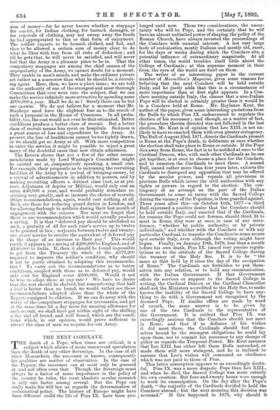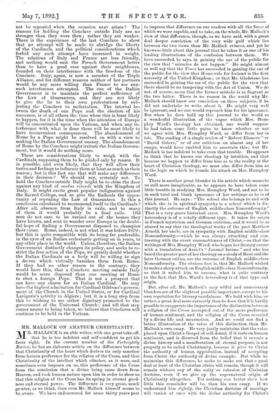THE NEXT CONCLAVE. T HE death of a Pope, when times
are critical, is a subject which allows of more unreserved speculation than the death of any other Sovereign. In the case of all other Monarchies, the successor is known, consequently his qualities are matter of observation. In the case of the Papacy, the successor can at most only be guessed at, and not often even that. Though the Sovereign must always be a factor of some importance in the policy of the country he rules, the most absolute secular monarch is only one factor among several. But the Pope can really make his will law as regards the determination of ecclesiastical policy. The history of Europe might have been different could the life of Pius IX. have been pro- longed until now. These two considerations, the uncer- tainty who will be Pope, and the certainty that he will have an almost unlimited power of shaping the policy of the Roman Church, have always invested the proceedings of the Conclave with unusual interest. A not very large body of ecclesiastics, mostly Italians and mostly old, exert, for the days or weeks during which the Conclave sits, a potential influence of extraordinary magnitude. At all other times, the world troubles itself little about the College of Cardinals ; at this supreme moment in their lives, the eyes of the world are fixed on them.
The writer of an interesting paper in the current number of Macmillan's Magazine, gives some reasons for believing that the next Conclave will be held outside Italy, and he justly adds that this is a circumstance of more importance than at first sight appears. In a Con- clave meeting outside Italy, the chance that a non-Italian Pope will be elected is certainly greater than it would be in a Conclave held at Rome. Mr. Roylance Kent, the author of the paper, gives some interesting quotations from the Bulls by which Pius IX. endeavoured to regulate the election of his successor ; and though, as a matter of fact, the procedure therein directed was not followed in the last election, Mr. Kent is of opinion that Leo XIII. is not un- likely to have re-enacted them with even greater stringency. The Bull of August 23rd, 1871, directs the Cardinals present in Rome at the Pope's death, to deliberate at once whether the election shall take place in Rome or outside. If the Pope dies away from Rome, the fact is to be notified at once to the Cardinal Deacon, who, with such other Cardinals as he can get together, is at once to choose a place for the Conclave, and to summon the Cardinals to meet there. A second Bull, issued rather more than four years later, exhorts the Cardinals to disregard any opposition that may be offered by the secular power, and repeals all provisions in previous Bulls which invest the civil authorities with any rights or powers in regard to the election. The con- tingency of an attempt on the part of the Italian Government to come to terms with the Sacred College during the vacancy of the Popedom, is thus guarded against. Three years after this—on October 10th, 1877—a third Bull expressed a positive desire that the Conclave should be held outside Italy, and enacted that if the Cardinals, for reasons the Pope could not foresee, should think fit to meet in Rome, they were at once, in case of any inter- ference, "whether by public authority, or by private individuals," and whether with the Conclave or with any particular Cardinal, to transfer the Conclave to some secure spot outside Italy, even although the voting might have begun. Finally, on January 10th, 1878, less than a month before his own death, Pius IX. issued very precise regula- lations as to the attitude of the Sacred College during the vacancy of the Holy See. It is to be "the same as that held by it since the day of the occupation of Rome." The Cardinals are forbidden to put them- selves into any relation, or to hold any communication, with the Italian Government. If that Government offers its services or support to the Sacred College in writing, the Cardinal Deacon or the Cardinal Chancellor shall ask the Ministers accredited to the Holy See, to make known the inability of the Sacred College to have any- thing to do with a Government not recognised by the deceased Pope. If similar offers are made by word of mouth, the same answer is to be given by one of the two Cardinals to the representative of the Government. It is evident that Pius IX. was exceedingly anxious that the Conclave should not meet in Rome, and that if in defiance of his wishes it did meet there, the Cardinals should feel them- selves bound by the strongest obligations he could lay upon them, not to commit his successor to any change of policy as regards the Temporal Power. Mr. Kent assumes that Leo XTTT. has either left these Bulls untouched, or made them still more stringent, and he is inclined to assume that Leo's wishes will command an obedience which was not paid to those of Pius. This latter assumption appears to us exceedingly doubt- ful. Pius IX. was a more despotic Pope than Leo and when he died, the Sacred College was more entirely his own creation. But four-and-twenty hours were enough to work its emancipation. On the day after the Pope's death, "the majority of the Cardinals decided to hold the Conclave abroad ; but the next morning this decision was reversed." If this happened in 1878, why should it not be repeated when the occasion next arises ? The reasons for holding the Conclave outside Italy are no stronger than they were then ; rather they are weaker. There is the experience of the last Conclave to show that no attempt will be made to abridge the liberty of the Cardinals, and the political considerations which forbid any such attempt have increased in weight. The relations of Italy and France are less friendly, and nothing would suit the French Government better than to have a good case against their neighbours, founded on their interference with the freedom of the Conclave. Italy, again, is now a member of the Triple Alliance, and for different reasons neither of her partners would be any more willing than France to see any- such interference attempted. The cue of the Italian Government is to maintain the perfect sufficiency of the Law of Guarantees, and they are not likely to give the lie to their own protestations by sub- jecting the Conclave to molestation. The interval be- tween the death of one Pope and the election of his successor, is of all others the time when this is least likely to happen, for it is the time when the attention of Europe will be concentrated upon the Vatican, and when any in- terference with what is done there will be most likely to have inconvenient consequences. The abandonment of Rome by a Pope might be resolved on with a view to making the Italian Government uneasy. The abandonment of Rome by the Conclave might irritate the Italian Govern- ment, but it would do nothing more.
These are considerations likely to weigh with the Cardinals, supposing them to be guided only by reason. It is possible, and even likely, that they will allow their tastes and feelings to influence them at least as much as their reason ; but is this fact one that will make any difference in their decision ? We should say, certainly not. To hold the Conclave outside Italy might be to close the door against any kind of modus vivendi with the Kingdom of Italy. It might excite great popular indignation against the Sacred College, and so give the Radicals the oppor- tunity of repealing the Law of Guarantees. Is this a conclusion calculated to recommend itself to the Cardinals ? After all, absence from Italy is exile, and to many of them it would probably be a final exile. Old men do not care to be turned out of the homes they have known, and sent to wander over Europe in the doubt- ful hope of finding a Government disposed to champion their cause. Rome, indeed, is not what it was before 1870; but this is quite compatible with its being far preferable, in the eyes of an Italian ecclesiastic getting on in years, to any other place in the world. Unless, therefore, the Italian Government distinctly changes its policy, and seeks to re- strict the free action of the Pope, we greatly doubt whether the Italian Cardinals as a body will be willing to sign a decree which virtually banishes them from Rome. If they had no other reason to the contrary, they would have this, that a. Conclave meeting outside Italy would be more disposed than one meeting at Rome to elect a foreign Pope. That is not a prospect that can have any charm for an Italian Cardinal. He may have the highest admiration for Cardinal Gibbons's govern- ment of the Church in the United States, or for Cardinal Lavigerie's activity in Algiers ; but it is a long step from this to wishing to see either dignitary promoted to the government of the Universal Church ; and till that step comes nearer to being taken, we believe that Conclaves will continue to be held in the Vatican.







































 Previous page
Previous page